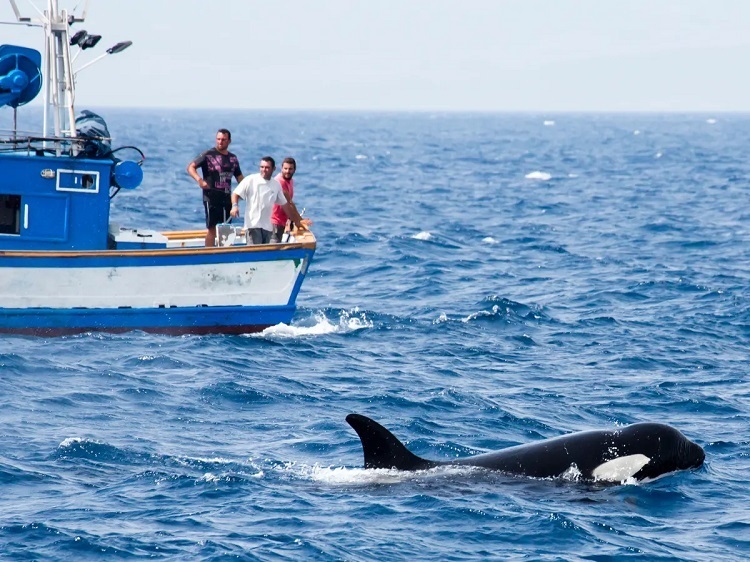Why Does an Orca The Killer Whale Beach Itself?
When it comes to why whales beach themselves, researchers have yet to come up with a conclusive answer; nonetheless, they have developed many ideas and theories to account for this phenomenon. Whale beaching occurs when a whale becomes stranded on the beach. This is also known as a cetacean stranding. Whale beaching harms their lives since it is difficult for these marine mammals to return to the ocean after washing up on the beach. As a result, they perish from thirst or the weight of their bodies.
In this post, let’s examine why an orca the killer whale beach itself.
Table of Contents
Types of Strandings
The two types of whale beaching include:
Lone Strandings
A solitary whale becomes stranded due to an accident or sickness. A beached whale may get isolated from its family in certain instances. Single strandings occur when a whale dies naturally or suffocates in fishing nets. Some beached whales exhibit net scars and injuries that indicate the reason for their beaching.
Mass Strandings
Whales are primarily gregarious animals that travel in big groups called pods. Mass strandings occur when more than two pod members get stranded on land, most commonly because the pod leader’s navigational abilities fail and the whole pod is beached.
Also, dolphins and whales get stranded when the pod becomes sick with a disease. Sonar surveys, which obstruct their navigation, are a major cause of large strandings.
Why Do Orca Whales Beach Themselves?
Every year, whales and other marine creatures, such as dolphins, get stranded. Although there are different ideas about why whales beach, no one is certain.
Why do whales beach themselves? They beach for a variety of causes, including:
Natural Causes
Natural reasons for mass stranding include infections, damage, famine, and loss of direction. Whales that are weak wander until they wash ashore on land. When a female whale is in labour, she may wash up on the shore.
Beached whales may be damaged whales fleeing their predators. Earthquakes, magnetic surges, volcanic eruptions, and storms are natural causes.
Environmental Causes
Some environmental elements have a role in whale beachings. These factors include anything from water topography to changing climate and pollution. Climate change is the leading cause of whale beachings since it raises ocean temperatures and induces acidity.
Some whale species, such as pilot whales and bottlenose dolphins, are affected when their prey migrates into risky places for them. Toothed whales utilise their exceptional sensory abilities to find food and navigate. When marine creatures lose their sense of direction and find themselves in shallow water, this often results in a mass beaching of the animals. Water contamination also contributes to the increasing number of beached whales by poisoning them through the consumption of poisonous compounds.
Seismic and Sonar Surveys Cause Noise Pollution
Noise pollution is another reason whales get stuck. Sonar is an acronym that stands for sound navigation and ranging.
Using sonar and seismic surveys causes whales to become disoriented, ultimately leading to losing their sense of direction.
Sonar is a technique used by both the commercial and military sectors to detect goods submerged on the ocean floor. It is especially harmful to whales because it interferes with their capacity to communicate and navigate their environment.
Numerous other whale species have beached due to the military’s sonar activity. Sonar may cause internal haemorrhaging in whales. When sonar pulses strike a whale, they kill the tissues in the eyes and brain, causing it to beach.
Orca’s Intentional Beaching
Orca whales are among the few species that seldom strand, but they do it on purpose when chasing their food. It has developed the ability to swim effectively in shallow water and follow seals up to the beach’s beaches, waiting for strong waves to send them back into the ocean.
An orca the killer whale, intentionally beaches itself. This is a talent that is handed down through generations.
Human Activities
Whales wash up on the shore as a consequence of certain human activity. Fishing operations also have a key impact on the stranding of whales. They overfish, harming the marine food chain and leaving too little food for whales. They have no alternative except to swim to shallow waters in quest of prey if they are to survive. One of the causes of the strandings of more giant whales is their inability to navigate shallow seas.
Humans create tonnes of environmental contaminants that reach the water via numerous channels due to growing industrialisation. These poisons make whales ill and infect them with diseases. It may also disrupt their navigation, resulting in widespread strandings of whales.
There is also the risk of whales being struck by ships on the open sea. It is a particular issue for North Atlantic right whales and other slow-swimming animals. They are struck by moving boats, resulting in serious injury or death. One of the reasons some see beached whales is ship crashes.
Summary
Scientists have needed help to comprehend whale beachings fully. However, based on some scientific data, we know that people and ecological vices lead to orca the killer whale mass beachings.


